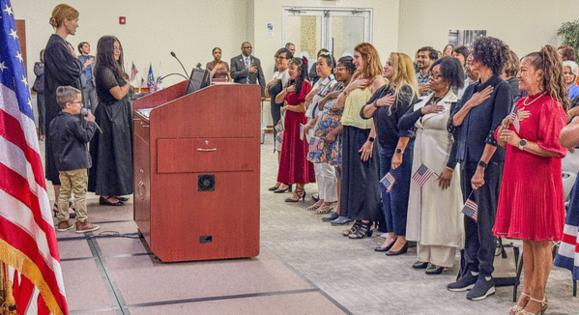The US citizenship test might soon get harder for immigrants to pass
Published in News & Features
For millions of permanent residents hoping to become U.S. citizens, the journey could soon get harder, as federal officials are preparing to revive a tougher version of the citizenship test.
The move could be coming soon, said Joseph Edlow, the new director of U.S. Citizenship and Immigration Services. Edlow believes the current test is simply too easy.
“The test as it’s laid out right now, it’s not very difficult,” said Edlow during an interview with The New York Times. “It’s very easy to kind of memorize the answers. I don’t think we’re really comporting with the spirit of the law.”
More than 95% of all applicants pass the naturalization test, according to U.S. Citizenship and Immigration Services.
Edlow said the agency will implement a version introduced during the first Trump administration in late 2020. This test requires to correctly answer 12 of 20 questions, double the current requirement of 6 out of 10. The questions are drawn from a list of 128, up from 100. Of those, 72 are about the U.S. government, and the rest cover American history, symbols and holidays. (Applicants who are 65 or older only need to answer 6 out of 10 questions right in both versions of the test.)
At that time, advocates and legal experts criticized the version as overly complex.
The Biden administration ended the change in February 2021 and brought back the 2008 civics test.
Citizenship is open only to those already granted status as permanent residents. There are a number of ways to seek permanent residency, such as family or marriage connections. An immigrant can apply for citizenship after five years as a permanent resident, or three years for those married to a U.S. citizen.
Advocates and legal experts say reinstating the 2020 version of the citizenship test would limit access to naturalization.
“It’s going to be harder, and it’s going to discourage some people,” said Jose Fernandez, immigration services program manager for Catholic Charities in St. Petersburg.
Maria Pinzon, executive director of the Hispanic Services Council, a nonprofit in Tampa that helps immigrants with the citizenship process, said it could create additional barriers for those with language and education challenges or limited access to study resources.
“We believe it is important that the test continues to fairly measure an applicant’s knowledge while remaining accessible to those who meet the requirements,” said Pinzon.
Last year, more than 8.7 million lawful permanent residents were eligible for U.S. citizenship, according to the Department of Homeland Security. From October 2023 to September 2024, USCIS completed 818,500 naturalizations, meaning about 9% of those eligible became citizens.
Mark Kukis, director of the Citizenship Coalition, a nationwide network of volunteers that provides free tutoring to immigrants applying for citizenship, said that number could drop further if the test is harder.
“They (immigrants) have played by the rules and in many cases made very difficult journeys in the hope of becoming U.S. citizens,” said Kukis. “Why put up yet more obstacles for people who come to the United States for all the same reasons so many generations of immigrants have come before?”
Some of the questions in the 2020 version demand a higher level of English comprehension, advocates said, such as, “Many documents influenced the U.S. Constitution. Name one,” which could require recalling obscure sources like the Iroquois Great Law of Peace or the Fundamental Orders of Connecticut.
Danielle Hernandez, an immigration attorney in Ybor City, said the changes are most likely aiming to screen out more people without a strong command of English. She said her clients who already speak conversational English “struggle” with certain legal terms, and it feels unfair.
During the naturalization interview, questions are asked and answered orally, and they are not multiple choice.
Marija Hannen, a citizenship instructor and naturalization navigator at Learning Empowered in St. Petersburg, said having more material to study will definitely create challenges. Even for those who speak good English, said Hannen, it will be a lot more work to prepare for the test.
Stricter immigration enforcement and zero-tolerance policies are speeding up deportations, including cases involving permanent residents who might one day become citizens.
The Florida Immigrant Coalition, a nonprofit that advocates for immigrant rights in Florida, said in a statement the 2020 version is meant to make it harder to become U.S. citizens.
“We need to play fair, and this is not it,” the coalition said.
_____
©2025 Tampa Bay Times. Visit tampabay.com. Distributed by Tribune Content Agency, LLC.







Comments